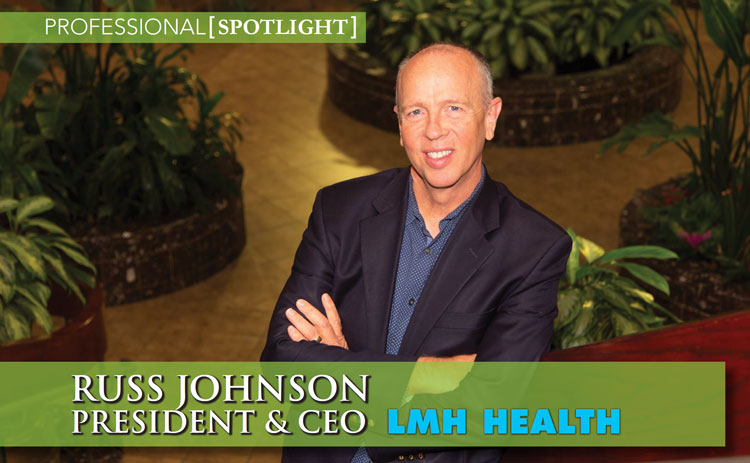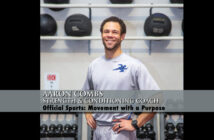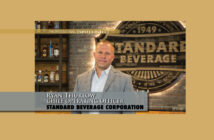President & CEO, LMH Health
| 2019 Q4 | story by Russ Johnson | photo by Steven Hertzog

Russ Johnson, President and CEO, LMH Health
What is LMH Health’s most important commodity or service?
We are a missional organization creating healthy communities through exceptional health care, regardless of a person’s ability to pay. We are focusing on broad access and convenience across Lawrence and our surrounding communities. From expansion at our Maine Street Campus to our East Heights Family Clinic to the future West Campus—and through our primary and specialty care practices, new technologies, fitness and education programs, and community partnerships—we are committed to providing the high-quality services you need for a lifetime of healthy living close to home.
What is LMH Health’s most important priority?
This is a transformative time for health care, not just in Douglas County but nationwide. Medical treatment advances and technological innovations are growing at exponential levels. Simultaneously, health care costs skyrocket, creating hardship not only for hospitals but, more importantly, for patients. To continue to do right by our community during this evolution, LMH Health must evolve, too. We must continuously focus on being a more effective organization. We can’t just get through a change or effectively navigate a current challenge; we must become truly comfortable in the midst of change.
We are faced with, and we will make difficult decisions. But we will remember that we are a missional organization. At our core, our role as a service organization has never been bigger or more important.
What have been some of the most important aspects of your success?
Community support, the caliber or our medical staff and our amazing employees. Over the past two decades, LMH Health transformed from an ordinary community hospital into an exceptional one. The quality of care improved, the organization became financially sound and LMH Health moved to the “next level” as a community hospital. It’s no wonder that the citizens of Lawrence and Douglas County are absolutely passionate about this hospital. This passion and community support is further reflected by the level of philanthropic support we receive. As a not-for-profit community hospital that receives no tax support—yet provides millions of dollars every year in charitable care—community philanthropic support is crucial. Gifts to the LMH Health Foundation elevate the level of care we provide throughout the organization. Every day, we’re so grateful for this kind of support, as it has truly helped us grow into the hospital our community needs and deserves.
How many people do you work with, serve, interact with on a daily basis and are responsible to? Or for?
We’re fortunate to have the commitment of 1,800 talented employees, physicians and clinicians at LMH Health. The LMH Health Board of Trustees—the operating board of the hospital and the people to whom I answer—is comprised of nine individuals who are appointed by the mayor of Lawrence and approved by the full city commission. We work with nearly every provider in our service area, which extends outside of Douglas County and includes about 196,000 residents. Our 600-plus volunteers provide tremendous support to our operations and represent one of the largest youth volunteer programs anywhere. Each of these individuals takes his or her role extremely seriously—which makes it possible to provide medical care to an ever-growing community. On any given day, LMH Health provides 2,000 incidents of care across 30 locations. And we’re fortunate to have wonderful partners in the LMH Health Foundation—the more than 1,700 donors who provide philanthropic support each year provide a margin of excellence as we deliver exceptional care in exceptional facilities.
How do you and your industry make a positive impact on the Lawrence community?
Our purpose, “A Partner for lifelong health,” is all about making a positive impact and fulfilling our significant social contract. LMH Health provides quality and compassionate health care—for all, regardless of ability to pay. In our first 10 months of this year, LMH Health has provided more than $13.5 million in uncompensated charitable care. As a community-owned, not-for-profit health-care system, charitable care is not only an imperative, it guides our decision-making every day. This is a big, complex business enterprise, but its heart is about the common good. Last month, we celebrated the grand opening of our East Heights Family Care Clinic. The new clinic, which was largely funded by philanthropic gifts, will serve an area of the community that had been previously underserved. We are building partnerships with our colleagues in mental health, addiction, food scarcity, housing, education and other agencies with whom we share a mission. We know that by working together as partners, we will have a broader, more enduring impact on our community’s health.
What do you see as your personal responsibility and the industry’s responsibility to the community?
My personal responsibility is to provide leadership. To me, that means a clear sense of vision for the future, communicating that openly and setting the tone for the way in which we will pursue that vision. In the challenging and uncertain arena of health care, that can be daunting. Our leadership takes to heart our purpose statement: “A partner for lifelong health,” and we are making real progress in keeping people healthy, in addition to treating them when they’re sick. Much of my responsibility now is to better understand how the role of the hospital is changing and the impact that social determinants have on people’s health and well-being—poverty, housing, abuse, genetics, unemployment, transportation, trauma and mental health. I see my responsibility as supporting our team’s ability to knit together a broad fabric of services, locations, technology and talent into a cohesive, effective and sustainable organization. Creating healthy communities is a team effort—it takes communication and collaboration among the many health and human service organizations across our community. We are partnering with other community nonprofits to find better and healthier solutions for everyone. We don’t have all the answers yet, but the level of interaction, dialogue and planning that’s taking place has the potential to become a model for other communities.
What would you change about doing business (or working with businesses) in Lawrence?
My wife, Isabel, and I have grown to love Lawrence as a place to live and work. There is so much to appreciate about this community, the hospital and the business partners we work with. Through my involvement with the Chamber and EDC, I am learning about the challenge of adequate housing in Lawrence and the concerning prospects for meeting these needs over the next 10 years. I have no doubt that growth—significant growth—is in our future. I think our community would be well-served by a clearer, unified vision and purpose. One that helps guide how we will grow and prosper in a manner that recognizes and respects what’s best about the community while creating the opportunity for new families and businesses to share in what we love about Lawrence. That’s a tall order, but I think we should be taking it on.
What inspires you? Is there a specific thing, person or incident?
I am so fortunate to work in a field that is full of people who chose their career because it combines analytical, diagnostic and motor skills with a deep sense of passion and purpose. I’m trained in economics and health administration, and so I have tremendous respect and awe, frankly, for the employees and clinicians that provide the care and make the decisions that actually save lives and lead to recovery. That is an enormous responsibility, and their work inspires me every day. One of my favorite things about LMH Health is hearing and sharing stories of team members who went above and beyond to support a patient facing a difficult situation. Every day, we see our volunteers, employees, caregivers and physicians take a personal approach to care—it is truly patient first. This is why we do what we do. It matters, and it’s inspiring.
What is the biggest challenge you feel your industry is facing now?
Financial uncertainty. 2019 brought a downturn in hospital operating revenue and margin due to a number of factors that are common to nearly every hospital. These are challenging times for health-care providers, and unfortunately, we’re not insulated from that. Recently, we’ve experienced a significant change in our contractual agreements with commercial payers—this shifting insurance landscape signals where we are headed in health care, and the answer is clear: We must cost less. There is tremendous pressure on cost, because the country cannot afford the health-care system we have created. Even as a not-for-profit hospital, we must implement long-term and immediate strategies to address these factors. LMH Health is a very strong hospital with years of clinical, operational and financial excellence. We will continue that trend; we are dedicated to being an excellent steward of your community hospital.
What do you foresee as being the biggest challenge for the future of your industry? And how are you addressing or preparing for it?
The country is struggling to figure out how we can afford our health-care system and keep the model of delivery we have. Those two goals may not be compatible, and it will mean significant pressure for change on multiple fronts: legislative actions, Medicare/Medicaid reform, the growth of consumerism, the major insurers exerting their muscle, new entrants into the market (Google, Apple, Amazon), vertical integration like Aetna and CVS, technological disruptors that move care out of facilities and into the home, and more consolidation of providers/hospitals. The result will be a dynamic market that requires flexibility, innovation, scale and capital to succeed. The challenge will be in developing our team (staff, physicians and advanced practice professionals, managers) to be adept at changing and improving our business at every level. As a community hospital, it will mean carefully considering strategic partnerships that provide scale and clinical integration while preserving local governance and autonomy.
We are preparing for this every day by building the workplace culture and skills to succeed in a changing environment. We are engaging with clinicians throughout the community, developing points of service across our market that are convenient and consumer-friendly, investing in technologies that make a real difference in the care of our patients, advancing consumer access and convenience, which liberate clinicians and nurses to spend their time with the patients and not at the keyboard. We are expanding our analytics capability and utilizing data for optimal clinical and operational performance. Most importantly, we are committed to retaining and recruiting excellent staff that combine skill and expertise with compassion and service. If we get these things right, we’ll successfully navigate the choppy waters ahead.



